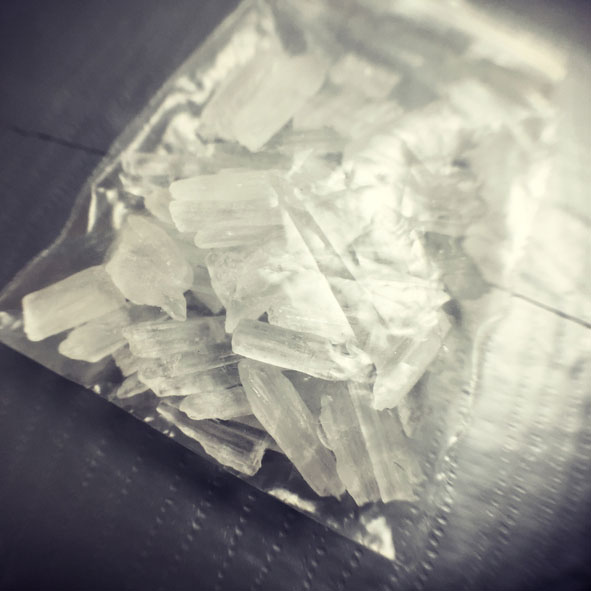The Effects of Methamphetamine
 Methamphetamine (also known as ice, meth, crystal, or chalk) is very addictive; anyone using it may develop a dependence on the drug. Long-term meth use can bring risky behavior, cravings, brain issues, and a lack of self-control. It’s common for meth users to always be seeking out the next high, leading to a destructive “binge-and-crash” pattern.
Methamphetamine (also known as ice, meth, crystal, or chalk) is very addictive; anyone using it may develop a dependence on the drug. Long-term meth use can bring risky behavior, cravings, brain issues, and a lack of self-control. It’s common for meth users to always be seeking out the next high, leading to a destructive “binge-and-crash” pattern.
Methamphetamine is the most commonly used drugs today, behind alcohol and marijuana. Since meth is highly addictive, it can be very hard to quit. There are many risks to the fetus and the pregnant mother, which we’ll share in this article. It almost goes without saying that meth use should be avoided during pregnancy. However, stopping all of a sudden could make you go into withdrawal. If your doctor prescribed methamphetamine, make sure to call him or her as soon as you know you’re pregnant.
Effects of Meth on a Pregnant Woman
Meth can harm your body and put you at risk for pregnancy complications. Women who abuse meth usually have a lower body mass index (BMI), making a pregnancy riskier. Having a lower BMI increases the chance for pregnancy complications and longer hospital stays. The effects of meth may also result in your baby growing poorly or not getting enough oxygen.
Some pregnant women who abuse meth might have unhealthy habits that may cause health problems for both herself and her baby. If you have an unhealthy diet, for example, you won’t be getting enough nutrients for a healthy pregnancy. And sharing methamphetamine needles increases your risk of diseases like hepatitis C and HIV, which can affect your baby.
Effects of Meth on a Baby’s Development
Using meth during pregnancy can harm the way a baby develops in utero. Meth use can put a baby at risk for having a low birth weight, small size for their age, and an increased risk of neurodevelopmental problems.
Meth use has been connected to a higher chance for poor growth (baby is born too small and/or with a small head), premature delivery, and low birth weight. Some studies also suggest that meth abuse in pregnancy can increase the chance for placental abruption, fetal distress, high blood pressure, and SIDS. Issues during pregnancy are more likely to happen if meth is misused during your whole pregnancy, or taken at high doses.
The effects of meth use during pregnancy will affect the child long after he or she is born. The child may experience behavioral, developmental, cognitive, and physical dexterity issues as they grow up. For example, the child may face excessive stress and have a difficult time paying attention (similar to ADHD).
Will My Baby Go Through Withdrawal?
 When pregnant women use meth near the end of term, their baby may show signs of withdrawal once they’re born. Symptoms of withdrawal are sleeping a lot or not enough, trouble eating, having poor muscle control, being jumpy, and/or difficulty breathing. These symptoms typically go away within a few weeks but could also last for a few months. A baby exposed to meth might need to be admitted to a special care nursery.
When pregnant women use meth near the end of term, their baby may show signs of withdrawal once they’re born. Symptoms of withdrawal are sleeping a lot or not enough, trouble eating, having poor muscle control, being jumpy, and/or difficulty breathing. These symptoms typically go away within a few weeks but could also last for a few months. A baby exposed to meth might need to be admitted to a special care nursery.
We are not healthcare professionals, and we’re not here to give you medical advice. So, it’s important to tell your healthcare provider if you’ve been using meth during your pregnancy. Your doctor can do a detailed ultrasound to screen for birth defects and help you find the right resources.
If you’re using meth and pregnant, you might not be equipped to become a parent right now. A variety of women from many different backgrounds and situations have chosen adoption for their babies. By making an adoption plan, a mother can provide the best life possible for her baby, one that she might not be able to. Women chose adoption out of love for their baby. There are many hopeful adoptive parents out there who are open to adopting a baby who was exposed to meth. These adoptive couples have the resources to raise a baby who may have special needs. Adoption is always an option, even if you’re using drugs during your pregnancy.
